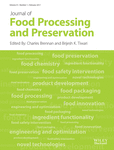Evaluation of the Effect of Different Sweetening Agents on the Polyphenol Contents and Antioxidant and Starch Hydrolase Inhibitory Properties of Kombucha
Abstract
Kombucha is a fermented beverage prepared from infusing tea leaves with a symbiotic association of bacteria and yeasts. While white sugar is the commonly known as energy source for this beverage, the usage of other sweeteners has not been studied. In this investigation, the following sweeteners were used for preparation of the Kombucha: Artificial sweetener – Aspartame, bees’ honey, brown sugar, white sugar, glucose, kitul palm honey (Caryota urens), palmyrah jaggery (Borassus flabellifer) and sucrose. The phenolic compounds and antioxidant and starch hydrolase inhibitory activities were studied. Brown sugar, white sugar, glucose and sucrose were the most effective in producing high antioxidant and starch hydrolase inhibitory activities. However, usage of bees’ honey, Caryota urens honey and palmyrah jaggery had not deterred the fermentation. Thus, although noteworthy changes to the antioxidant and starch hydrolase inhibitory activities were not observed, they could be used as alternative low-cost sweeteners for the preparation of Kombucha.
Practical Applications
Kombucha is an herbal beverage with a multitude of therapeutic properties. It is traditionally prepared by fermenting sugared black tea with a consortium of bacteria and yeast. Whether the addition of sugar could be replaced with other types of sweeteners especially those which are abundantly available and in use as indigenous ingredients is an aspect worthy of pursuing. This study explored this aspect using bees’ honey, the jaggery of Borassus flabellifer and the honey from Caryota urens as well as an artificial sweetener – Aspartame. Although the fermentation process has been effectively carried out by the microbes, the functional properties such as antioxidant and starch hydrolase inhibitory activities of the beverages were effected through substitution of sugar with these alternative sweetening agents. Thus, the study highlights that although indigenous sweetening agents may prove to be tempting as alternative sweeteners for the preparation of Kombucha, the therapeutic effects would be compromised.




